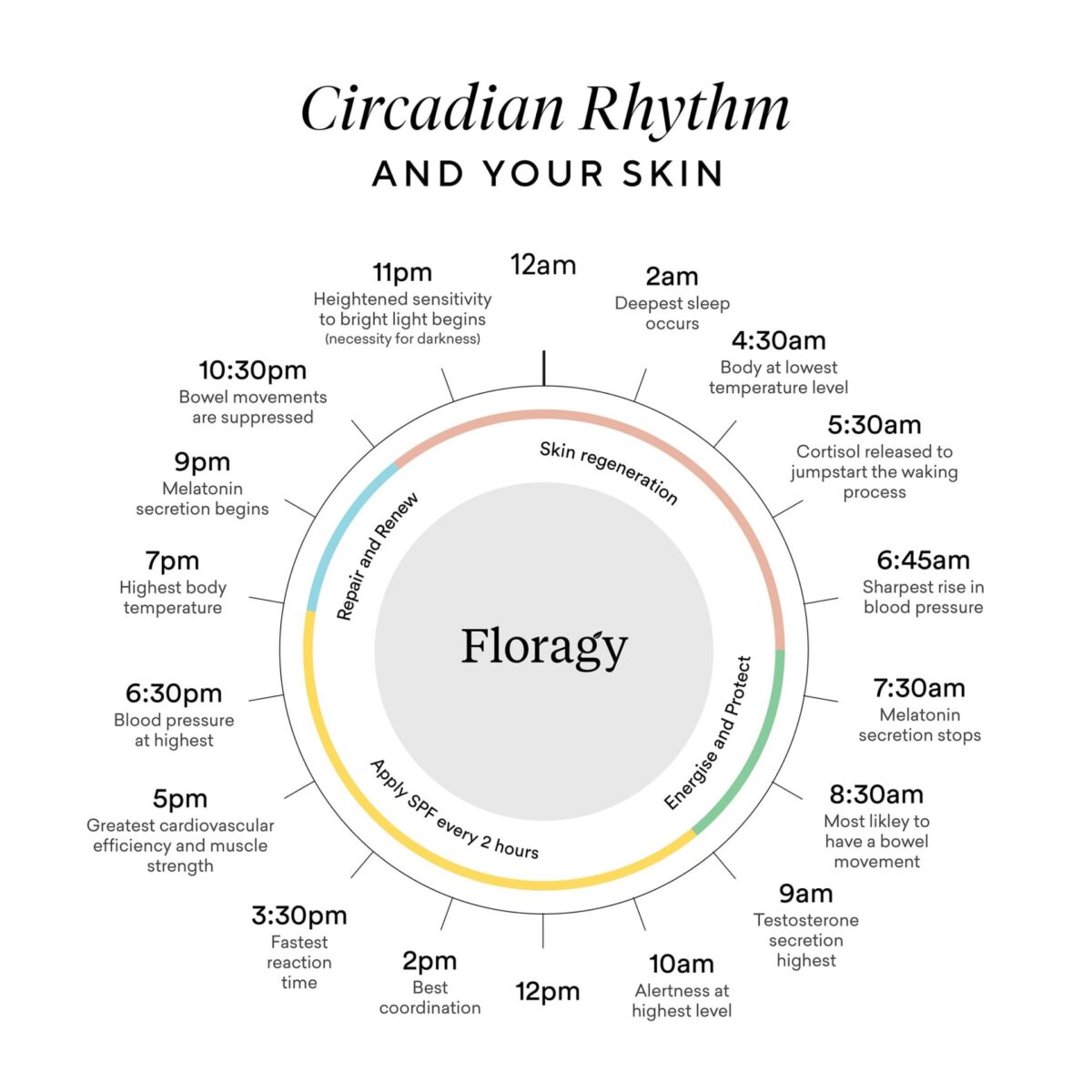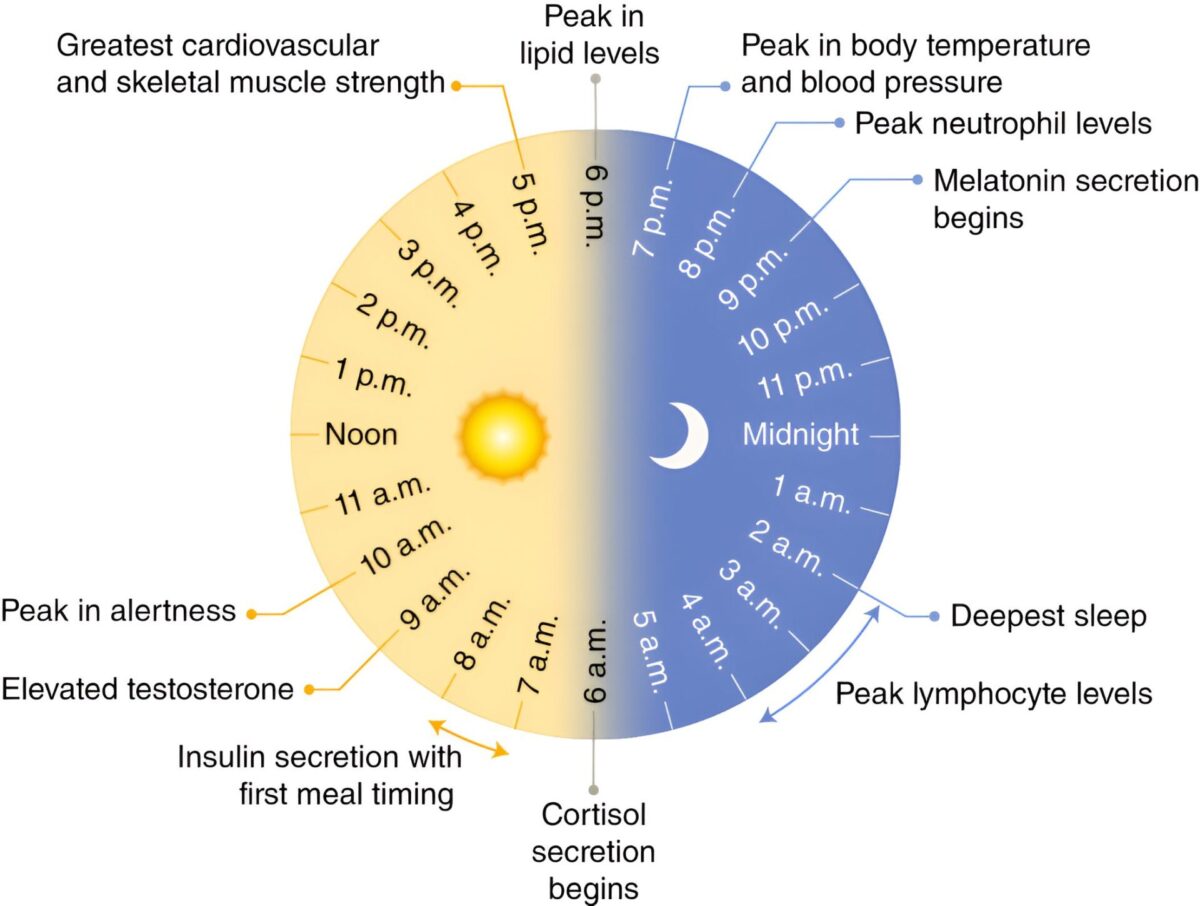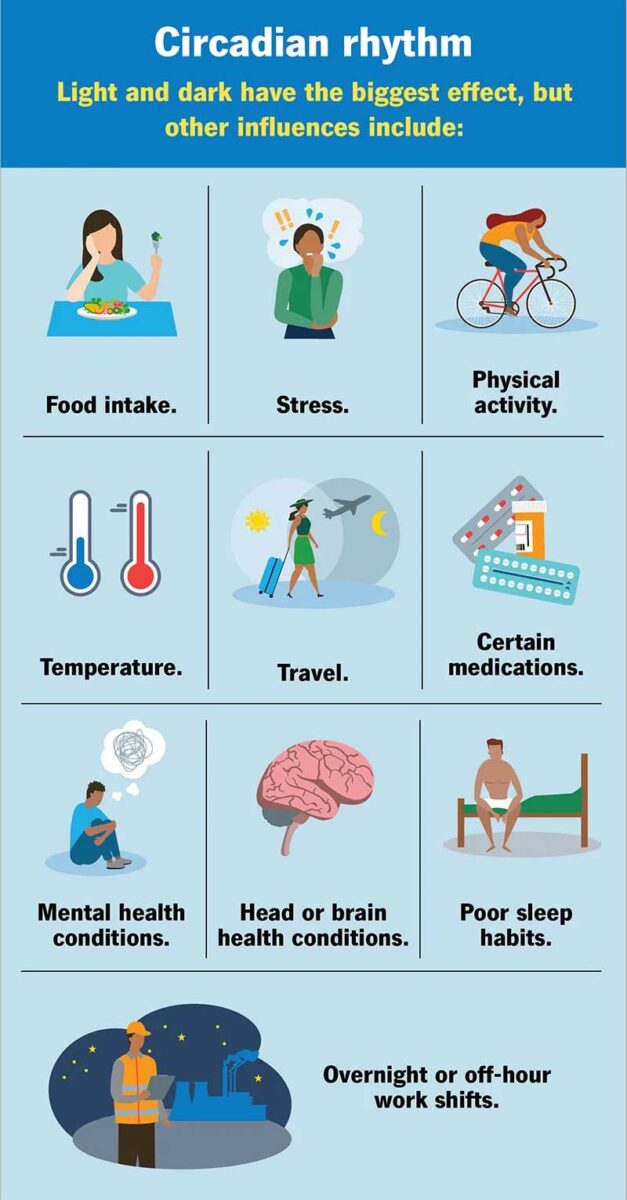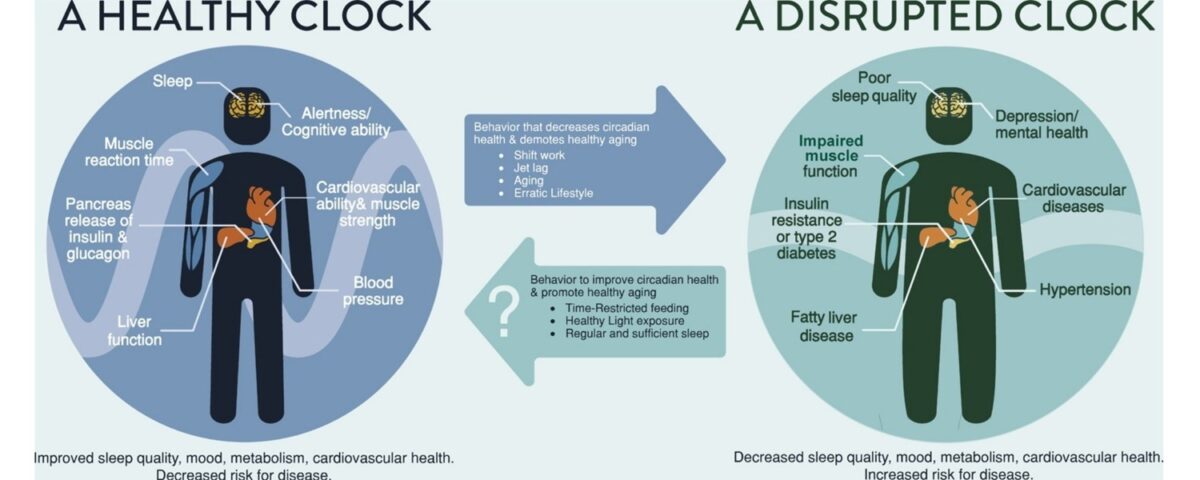Have you ever wondered how your daily habits affect your overall well-being? Understanding the concept of circadian health can unlock the secrets to optimizing your life. Your body operates on a natural clock, influencing everything from sleep patterns to metabolic functions. By aligning your routine with this clock, you can enhance your physical, mental, and emotional health. Join us as we explore the fascinating science behind circadian rhythms and discover how small adjustments can lead to significant improvements in your daily life. Embrace the rhythms of nature and thrive!
Understanding Circadian Rhythms: The Science Behind Your Body Clock
Circadian rhythms are the natural, internal processes that regulate your sleep-wake cycle and various bodily functions over a 24-hour period. These rhythms are influenced by multiple factors, including light exposure, hormones, and even your daily activities. Understanding circadian health is crucial, as it plays a significant role in your overall well-being.
Key Components of Circadian Rhythms:
- Suprachiasmatic Nucleus (SCN):
- The SCN, located in the brain, acts as the master clock, signaling time cues for other bodily functions.
- Light Perception:
- Light exposure, particularly blue light, helps calibrate your internal clock. Morning sunlight can enhance alertness, while evening darkness triggers melatonin production, promoting sleep.
- Hormones:
- Hormonal fluctuations, such as cortisol and melatonin, are closely tied to circadian rhythms. Cortisol peaks in the morning, preparing you for the day, while melatonin rises in the evening, signaling bedtime.
The Impact on Circadian Health:
When your circadian rhythms sync with environmental cues, such as natural light and consistent sleep schedules, you experience improved mood, enhanced cognitive functions, and stable energy levels. Conversely, disrupted rhythms can lead to sleep disorders, fatigue, and numerous health issues.
By prioritizing your circadian health, you can harness the power of your body’s biological clock, which promotes a harmonious balance for both mental and physical wellness. Understanding these rhythms is the first step towards optimizing your daily life.

The Importance of Sleep: Why Timing Matters
Sleep plays a crucial role in maintaining circadian health, impacting everything from mood to metabolic function. By aligning your sleep schedule with your natural body clock, you can enhance both the quantity and quality of your rest. Here are several reasons why timing matters:
- Regulation of Sleep Cycles: Your body has specific times when it naturally feels sleepy or alert. Adhering to a consistent sleep schedule encourages regular sleep cycles, optimizing restorative phases.
- Hormonal Balance: Sleep timing directly influences hormone production, including melatonin and cortisol. Proper alignment supports good sleep hygiene and improves stress management.
- Cognitive Function: Lack of sleep or irregular patterns can lead to cognitive decline. Prioritizing sleep at circadian-friendly times boosts memory, focus, and learning.
| Aspect | Consistent Timing | Irregular Timing |
|---|---|---|
| Hormone Regulation | Maintains balance and promotes health | Disrupts natural rhythms |
| Sleep Quality | High; deeper, uninterrupted sleep | Poor; frequent awakenings |
| Mood | Stable and positive | Mood swings and irritability |
By prioritizing sleep according to your circadian health, you harness the full potential of your body’s natural rhythms. In turn, this promotes better overall health and happiness, showcasing why timing truly matters when it comes to sleep!
How Light Exposure Influences Your Circadian Health
Light exposure acts as a powerful cue that syncs your internal body clock with the natural rhythms of day and night, fundamentally impacting your circadian health. The way light interacts with your circadian rhythms can lead to profound changes in your mood, sleep quality, and overall well-being. Here’s how light influences your body’s internal clock:
- Daylight Boosts Alertness: Natural sunlight stimulates receptors in your eyes, which helps to regulate melatonin production. By increasing alertness during the day, it sets a healthy sleep-wake cycle.
- Evening Light Disruption: Exposure to artificial light in the evening, especially blue light from screens, can confuse your circadian clock. This can delay melatonin release and shift your natural sleep cycle, leading to poor sleep quality.
- Seasonal Variations: Shorter daylight hours in winter can lead to a drop in mood and energy, impacting your circadian health. Conversely, longer days in summer can enhance mood and alertness.
To promote better circadian health, consider these light exposure strategies:
| Strategy | Benefits |
|---|---|
| Spend time outdoors in natural light | Enhances mood and regulates sleep |
| Limit screen time before bed | Improves sleep quality |
| Use bright light therapy in winter | Mitigates seasonal affective disorder |
By harnessing the power of light, you can align your daily activities with your natural rhythms, leading to improved physical and mental health. Make smart choices about light exposure, and you’ll reap the benefits of a well-regulated body clock!
The Role of Nutrition in Regulating Your Body Clock
Nutrition plays a crucial role in maintaining and promoting circadian health. What we eat not only provides energy but also influences our body’s internal clock. Here are some key aspects of how nutrition affects your circadian rhythms:
- Meal Timing: Eating at regular intervals helps synchronize your body clock. Consuming large meals late at night can confuse your circadian patterns, leading to disrupted sleep cycles. Aim for your last meal at least 2-3 hours before bedtime.
- Nutrient Types: Specific nutrients can enhance circadian health:
- Omega-3 Fatty Acids: Found in fish, they support brain function and may help regulate sleep cycles.
- Magnesium: Present in nuts and leafy greens, it aids relaxation and improves sleep quality.
- Melatonin-rich Foods: Cherries, grapes, and tomatoes help maintain healthy melatonin levels, aiding sleep onset.
- Hydration: Staying hydrated significantly impacts energy levels and mood. Dehydration can lead to fatigue, interfering with both daily functioning and sleep quality.
In contrast, a diet high in processed foods and sugars can lead to an unstable blood sugar level, exacerbating circadian misalignment.
In summary, making mindful dietary choices can optimize your circadian health. By timing your meals wisely and focusing on nutrient-rich foods, you can help your body clock stay in harmony, fostering better sleep and overall wellbeing.
Please click here to buy books or audio books about Circadian Health Nutrition from Amazon.

Physical Activity and its Impact on Circadian Rhythms
When it comes to circadian health, physical activity plays a pivotal role. Engaging in regular exercise not only enhances your overall fitness but also helps synchronize your internal body clock. Here’s how physical activity influences your circadian rhythms:
- Timing Matters: Exercising at the right time can boost your energy levels and improve sleep quality. Aim for morning or early afternoon workouts for optimal benefits.
- Hormone Regulation: Physical activity stimulates the production of hormones, like melatonin, which regulate sleep patterns. A good workout can naturally enhance the body’s ability to transition into restful states.
- Stress Reduction: Exercise reduces stress and anxiety, issues that can disrupt circadian health. Lower stress levels lead to improved sleep patterns and a well-regulated body clock.
Comparison of Exercise Timing and Effects on Circadian Health
| Time of Exercise | Effects on Circadian Health | Best For |
|---|---|---|
| Morning | Boosts alertness & energy | Early risers, productivity |
| Afternoon | Enhances mood & reduces stress | Overall wellbeing |
| Evening | May delay sleep onset | Not recommended for sleep |
In conclusion, incorporating physical activity into your routine not only enriches your physical health but also solidifies your circadian health. By choosing the optimal times for exercise and understanding its effects on your body clock, you can enhance your well-being and live a more balanced life.
Mental Health and Circadian Misalignment: A Hidden Connection
Circadian health plays a crucial role in our mental well-being. When our body clock becomes misaligned, it can lead to various mental health issues, including anxiety, depression, and cognitive impairments. Here’s how you can understand this hidden connection:
- Sleep Disruption: Disrupted circadian rhythms often lead to poor sleep quality, which is directly linked to increased stress and mood disorders. Sleep deprivation diminishes emotional regulation and resilience.
- Hormonal Imbalance: Circadian misalignment affects hormone production, particularly cortisol and melatonin. Elevated cortisol levels can exacerbate anxiety, while insufficient melatonin can impair sleep, creating a vicious cycle of mental health challenges.
- Reduced Exposure to Natural Light: Lack of natural light during the day often leads to lower serotonin levels, a neurotransmitter essential for maintaining a positive mood.
Comparison Table: Effects of Circadian Alignment vs. Misalignment
| Aspect | Circadian Alignment | Circadian Misalignment |
|---|---|---|
| Sleep Quality | Restful, restorative | Poor, fragmented |
| Mood Stability | Positive, balanced | Increased anxiety and depression |
| Hormonal Balance | Optimal cortisol and melatonin | Elevated cortisol, low melatonin |
| Cognitive Function | Sharp, focused | Impaired focus, forgetfulness |
By prioritizing circadian health, you can effectively support your mental well-being. Simple changes like maintaining a consistent sleep schedule, getting adequate natural light exposure, and practicing relaxation techniques can restore your body clock, leading to improved mental health outcomes.
Tips for Aligning Your Daily Routine with Your Body Clock
Aligning your daily routine with your body clock can significantly enhance your circadian health. Here are some practical tips to help you synchronize your activities with your natural rhythms:
- Establish a Sleep Schedule: Go to bed and wake up at the same time every day, even on weekends. Consistency reinforces your body’s internal clock.
- Optimize Light Exposure:
- Morning: Get natural sunlight as soon as you wake up. It boosts alertness and mood.
- Evening: Limit exposure to blue light from screens at least one hour before bedtime to signal your body for sleep.
- Mind Your Meals:
- Eat your main meals at consistent times. Try to consume dinner at least 2-3 hours before going to sleep. This helps your body prepare for rest and digest properly.
- Exercise Regularly: Aim for physical activity during daylight hours. Morning or afternoon workouts can enhance your circadian health, but avoid intense exercise close to bedtime.
- Listen to Your Body: Pay attention to your energy levels throughout the day. Schedule demanding tasks during peak performance times and save less intensive activities for when you feel sluggish.
By implementing these strategies, you can support your circadian health, leading to better sleep quality, improved mood, and overall well-being. Remember, small changes can have powerful effects on your body clock!

The Consequences of Disrupted Circadian Rhythms
Disrupting your circadian rhythms can lead to a plethora of adverse effects on both your physical and mental well-being. When your body clock is out of sync, it affects various aspects of health, resulting in:
- Sleep Disorders: Insomnia and other sleep disturbances become common, leading to chronic fatigue.
- Metabolic Issues: Disruption can result in weight gain, insulin resistance, and increased risk of type 2 diabetes.
- Mood Disorders: Anxiety and depression often stem from circadian misalignment, as irregular sleep patterns can exacerbate these conditions.
- Cognitive Decline: Impaired memory, reduced focus, and lower cognitive functioning can result from inconsistent sleep patterns.
| Consequence | Description |
|---|---|
| Sleep Disorders | Increased difficulty falling asleep or maintaining sleep can lead to fatigue. |
| Metabolic Issues | Higher chances of weight gain and increased blood sugar levels. |
| Mood Disorders | Enhanced feelings of anxiety and depression due to interrupted sleep cycles. |
| Cognitive Decline | Reduced ability to concentrate and make decisions can emerge from lack of sleep. |
Ultimately, prioritizing your circadian health is crucial. When you maintain a consistent routine aligned with your natural body clock, you can enhance your overall well-being. Simple adjustments, such as regulating sleep schedules and minimizing light exposure before bedtime, can make a significant difference in restoring balance to your circadian rhythms.
Embracing Natural Cycles: Benefits for Your Overall Wellbeing
Integrating natural cycles into your daily life can significantly enhance your circadian health and overall wellbeing. Understanding and embracing these rhythms can lead to a more balanced lifestyle. Here are some compelling benefits:
- Enhanced Sleep Quality: By synchronizing your sleep schedule with natural light patterns, you improve your sleep quality. This leads to more restorative sleep and better energy levels during the day.
- Improved Mood: Consistency with circadian rhythms stabilizes hormonal balance, reducing anxiety and enhancing your mood. A well-aligned body clock supports emotional resilience.
- Boosted Immune Function: Aligning activities with natural cycles helps optimize hormones like cortisol, which plays a critical role in immune response. A strong immune system is essential for overall health.
- Increased Productivity: By scheduling tasks during your peak energy times, you maximize focus and efficiency. This not only leads to better performance but also reduces burnout.
| Benefit | Embracing Natural Cycles | Ignoring Natural Cycles |
|---|---|---|
| Sleep Quality | Improved | Poor |
| Mood | Stable | Erratic |
| Immune Function | Enhanced | Compromised |
| Productivity | High | Low |
In conclusion, prioritizing your circadian health yields tangible benefits that promote a harmonious relationship with your environment. By respecting your body’s natural cycles, you unlock the potential for greater wellbeing and vitality. Start today and witness the positive changes in your life!
Future of Circadian Science: Insights and Innovations
As we delve into the future of circadian health, exciting innovations and insights promise to elevate our understanding of the body’s intrinsic clock. Researchers are making significant strides in the following areas:
- Wearable Technology: Advanced devices that track sleep patterns and light exposure will provide personalized insights. These gadgets can help individuals fine-tune their routines to align with their circadian rhythms, promoting overall wellness.
- Chronotherapy: Tailoring medication schedules to the body’s natural cycles shows great potential. By syncing drugs with circadian health, we can enhance their effectiveness and minimize side effects, leading to more successful treatments.
- Smart Home Lighting: Innovative lighting solutions can now mimic natural daylight patterns. By adjusting color temperatures and intensities throughout the day, these systems can help regulate your melatonin levels, supporting healthier sleep and wake cycles.
- Circadian Diet: Research into timing meals according to your body clock is gaining traction. The concept of chrononutrition emphasizes eating at specific times to optimize metabolism and energy levels, thereby enhancing circadian health.
In conclusion, the future of circadian science is promising. Embracing these insights will empower individuals to take control of their health and well-being. By aligning daily activities with our biological rhythms, we open the door to a healthier, more vibrant life.

Taking Control: Strategies for Better Circadian Health
Improving your circadian health requires intentional lifestyle changes that support your body’s natural rhythms. Here are effective strategies to help you take control and align with your internal clock:
- Consistent Sleep Schedule: Go to bed and wake up at the same time every day, even on weekends. This strengthens your body’s circadian rhythm.
- Smart Light Exposure:
- Morning: Get outside or expose yourself to bright light soon after waking. This boosts serotonin levels, signaling the start of your day.
- Evening: Dim the lights and reduce screen time before bed to promote melatonin production.
- Mindful Nutrition:
- Eat meals at regular intervals; aim for breakfast, lunch, and dinner around the same times each day.
- Focus on consuming whole foods and avoid caffeine and heavy meals close to bedtime.
- Regular Physical Activity: Engage in consistent exercise. Morning workouts can energize you, while evening routines should be calming to avoid stimulating your clock.
- Stress Management: Incorporate relaxation techniques. Practices like yoga and meditation help minimize stress, which can disrupt your circadian health.
By integrating these strategies into your daily routine, you can enhance your circadian health and improve your overall wellbeing effectively. Small adjustments lead to significant benefits, allowing you to live in harmony with your body’s inner clock.
Frequently Asked Questions
What is circadian health, and why is it important?
Circadian health refers to the regulation of various biological processes that follow a roughly 24-hour cycle, influenced primarily by light and darkness. It’s crucial because it affects sleep patterns, hormone release, eating habits, and body temperature. Maintaining circadian health ensures that our bodily functions operate optimally, which can lead to better sleep quality, improved mood, and reduced risks of chronic diseases. Understanding and respecting our body clock can significantly enhance overall wellbeing.
How does light exposure affect my circadian rhythm?
Light exposure, especially natural light from the sun, is a vital cue that helps regulate our circadian rhythm. When light enters the eyes, it signals the brain to adjust various hormones, most notably melatonin, which helps control sleep-wake cycles. Too much artificial light during evening hours can disrupt this process, potentially leading to difficulties in falling asleep and maintaining a restful night’s slumber. To support healthy circadian rhythms, try to get sunlight in the morning and limit exposure to bright screens before bedtime.
Can disruptions in my circadian health lead to health problems?
Absolutely! Disruptions in circadian health, such as irregular sleep patterns, shift work, or frequent travel across time zones, can lead to various health issues. Chronic misalignment of your internal clock has been linked to problems like obesity, diabetes, cardiovascular diseases, and mood disorders such as depression and anxiety. By prioritizing circadian health through consistent sleep schedules and lifestyle choices, you can mitigate these risks and foster a healthier life.
What are some strategies to improve my circadian health?
Improving your circadian health starts with establishing a consistent sleep schedule, going to bed, and waking up at the same time each day. Additionally, create a restful sleep environment that minimizes light and noise. Incorporating regular physical activity, especially earlier in the day, can enhance sleep quality. Reduce caffeine and heavy meals before bedtime, and utilize relaxation techniques such as meditation or deep breathing. Lastly, be mindful of your light exposure; seek bright, natural light in the morning and limit artificial light at night.
Is it possible to reset my circadian clock? How?
Yes, it is entirely possible to reset your circadian clock! One effective method is through gradual adjustments to your sleep schedule. Shift your bedtime and wake time by 15 to 30 minutes earlier or later each day until you reach your desired schedule. Consistent light exposure plays a key role; ensure you get plenty of morning sunlight to signal to your body that it’s time to be awake. Additionally, reduce exposure to bright screens at night to promote melatonin production for better sleep. Stay disciplined, and allow your body sufficient time to adapt!
